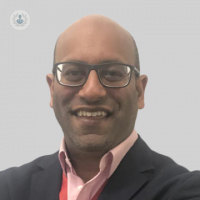How will I know if I have damaged my ACL?
Written by:Top Doctors recently spoke to distinguished consultant orthopaedic surgeon, Mr Hersh Deo, who, in our latest article here below, explains in depth what the anterior cruciate ligament (ACL) is, and outlines the most common ways people typically damage their ACL.

What is the anterior cruciate ligament (ACL)?
The anterior cruciate ligament is a very strong, three centimetres-long ligament that attaches from the front of the tibia (the shin bone) and passes backwards and diagonally to attach onto the back of the femur (the thigh bone). Its main functions are to resist rotation of the knee as well as forward sliding of the tibia on the femur.
How exactly do ACL injuries occur?
They commonly occur during sudden twisting, or sudden changes in direction, or with a contact injury, in sports such as football, rugby, and skiing.
How will I know if I have damaged my ACL?
There will be immediate pain and swelling within the knee. Most patients will actually hear a ‘pop’ or ‘crunch’ as the ligament tears or detaches from the bone itself. They then might notice the inability to fully straighten the knee as time goes on. A very typical sign a few weeks after the injury occurs is the knee giving way or collapsing, particularly when changing direction.
What are the treatment options?
There are many non-operative treatment options such as ice packs and crutches initially. Hinged knee braces are then often used to improve the mobility of the knee. Physiotherapy is, of course, highly effective for people who have suffered an ACL injury.
Surgical treatment, then, typically includes a procedure called an anatomic ACL reconstruction, using hamstring tendons. For high-risk patients who are at risk of re-rupturing, then I would also add in a procedure called a lateral extra-articular tenodesis.
Can ACL tears heal without surgery?
Not all ACL tears require surgery. Walking, swimming, and cycling can all do the world of good for all ACL tears, and if an individual does enough of these activities on a regular basis, surgery might not be required.
What does ACL surgery entail?
It is normally a day-case procedure performed under general anaesthetic. It involves doubling up the medial hamstring tendons to make a bundle of four. They then pass through a small tunnel to the tibia and the femur, and are firmly attached to both sides.
After the operation, there is immediate stability, and the patient will have a full range of movement. It is important to get some physiotherapy after surgery.
Mr Hersh Deo is a highly esteemed consultant orthopaedic surgeon who can guide you in the right direction in relation to your ACL tear. Contact him today via his Top Doctors profile to book an appointment with him.


